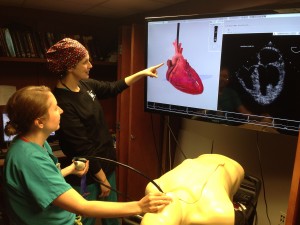Consortium of Anesthesiology Patient Safety and Experiential Learning (CAPSEL)
The Consortium of Anesthesiology Patient Safety and Experiential Learning (CAPSEL) encompasses the procedural and team training efforts of the Department of Anesthesia. Their core faculty provides assistance to and leads projects and workshops around the university and country.
Education:
The CAPSEL Team actively teaches medical students, residents, and other health professionals on topics ranging from physiology to advanced clinical procedures and interpretation.
More information about their courses can be found here.
Research:
Research is an important component of the CAPSEL core mission. The team is constantly performing evaluations of their educational efforts as well as leading patient safety initiatives throughout the Health System.
Facilities:
 The locations of the CAPSEL educational and research efforts vary by the needs and desired outcomes. The team utilizes in-situ locations as well as space that is available close to their point of care. Much of their weekly residency training occurs in the CSPSC facility.
The locations of the CAPSEL educational and research efforts vary by the needs and desired outcomes. The team utilizes in-situ locations as well as space that is available close to their point of care. Much of their weekly residency training occurs in the CSPSC facility.
History:
Task trainers and standardized patients were successfully integrated into the University of North Carolina School of Medicine curriculum in the early 1980s. In the fall of 1994, the first high fidelity simulator was purchased by the Department of Anesthesiology. Anesthesiology received a grant from the Burroughs Wellcome Research Foundation for $250,000 begin utilizing simulations in resident training. Over the next year the medical students began learning core principles of acute care with simulation methodologies in their third year anesthesiology rotation. By 1996, the simulator was being used by all the medical students in the School of Medicine and Anesthesiology residents.
In 1998, the School of Nursing worked with Dr. Fried in the Department of Anesthesiology to begin applying simulation learning activities into undergraduate and graduate nursing programs. Their application of simulation lead to the development a state-of-the-art facility to house a second high fidelity simulator.
The simulator purchased by the 1994 Burroughs Wellcome Research Foundation grant was the Medical Education Technologies Inc (METI) Human Patient Simulator (HPS) Model B mannequin. METI stopped supporting the HPS Model B in 2004 and the $100,000 needed to upgrade to the HPS Model C was supported by the Executive Associate Dean for Education, Dr. McCartney. She collocated the HPS with other task training simulators from the Department of Surgery and standardized patients program into the newly renovated Burnett-Womack Building.
Posts about simulation activities in the Department of Anesthesia
- ASA Block Workshop 2019
- ASA POCUS Workshop
- Day in the Life of an Anesthesiologist Workshop
- Simulation Supports Global Health
- Annual Pediatric Anesthesia Bootcamp
- UNCsim in Amsterdam
- Chest Decompression: Tubes, Needles, and Emergencies
- MOCA® Simulations at SPA2018
- Pediatric Anesthesia Simulation At The SPA
- Real-time Versus Delayed Video Simulation Assessments
Leave a Reply
